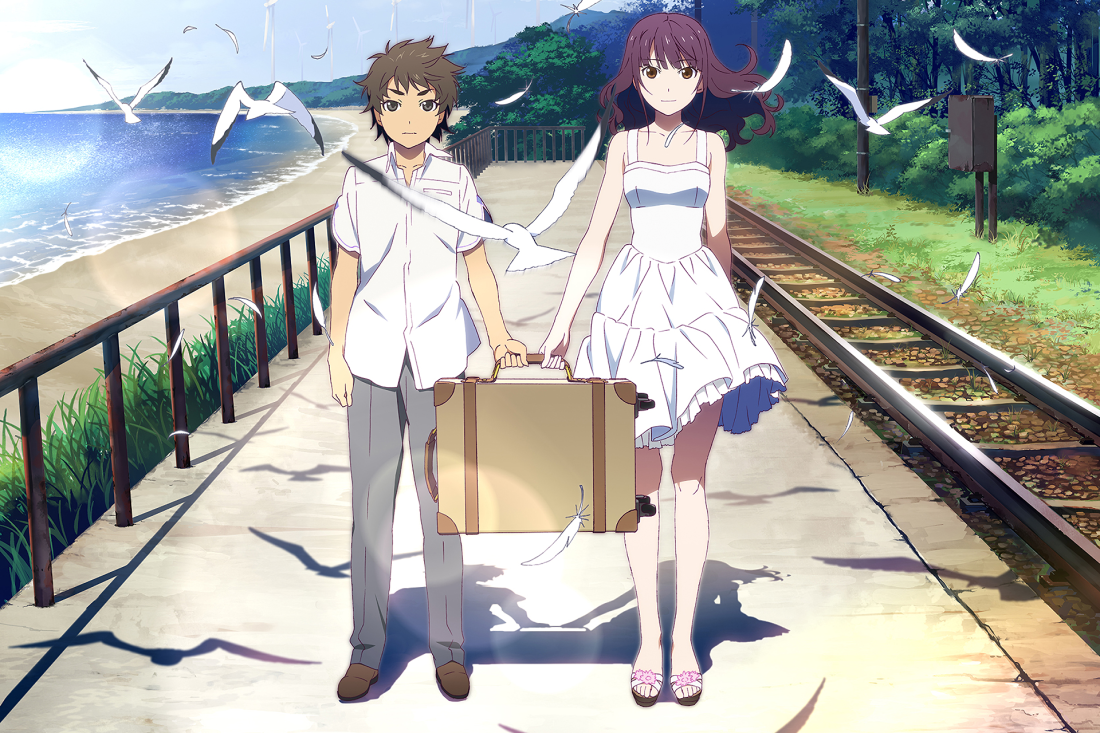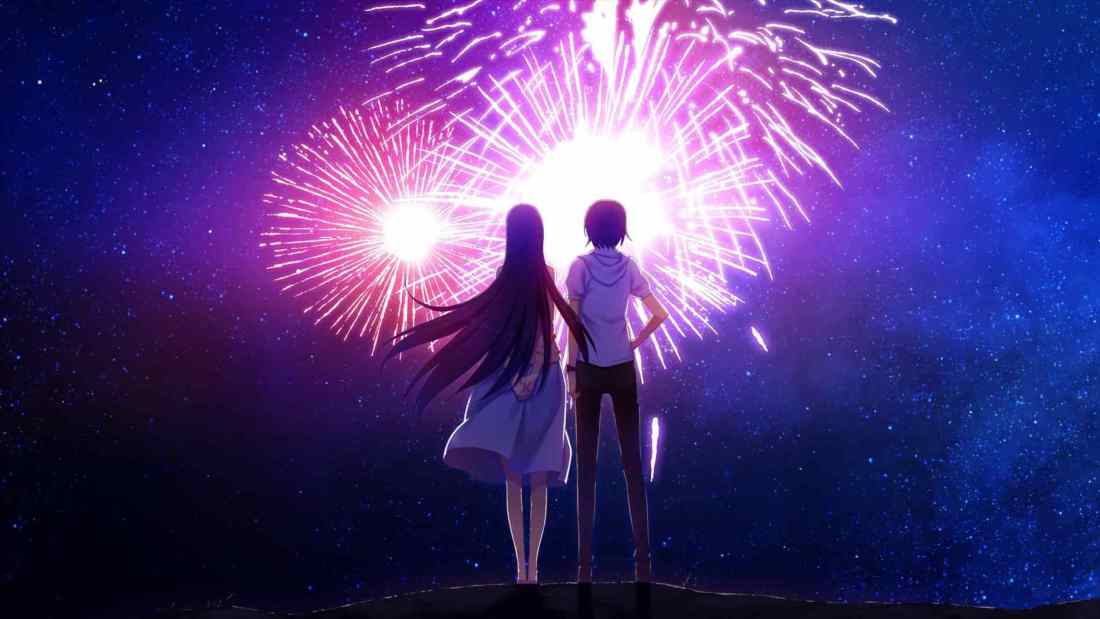I’ll admit I’m late to the show on this one. Uchiage Hanabi, Shita Kara Miru ka? Yoko Kara Miru ka?, also known simply as Fireworks, has been out in Japan since Summer of last year and has been seen by large parts of Anitwitter before this year even began; even I saw it over a month ago now and have honestly been putting off this article for way too long. Word of mouth in my circles for the movie has been overwhelmingly poor, to say the least, ranging from people encouraging others to just watch the music video of DAOKO’s theme song instead of the film, to people openly declaring it the worst anime movie ever made.
While I won’t deny DAOKO’s MV has most of the film’s best cuts in it and the song is actually really good too, I feel that the video loses out on most of what makes Uchiage Hanabi‘s narrative work. I’m aware I’m inviting some ridicule here: the movie’s structure and scenes are strangely abrupt, the dialogue frequently feels just a bit odd (for example, the titular question of whether fireworks are round or flat is asked frightfully often and it’s never quite explained why anyone should care about that), and the magical powers of the little crystal ball that drives the movie’s plot are never explained to a point where the events of the finale make any logical sense. In short: I am well aware of the flaws Uchiage Hanabi has. I’m here to argue why none of this matters to the story the movie is telling.
Uchiage Hanabi not trying to tell a logical story seems both a blatantly obvious statement to make looking at the complaints directed at it and like a very poor excuse for an illogical narrative. Bear with me a bit, though, because I mean it literally. The reason the movie makes so little internal sense is because it’s a literal fantasy: Norimichi dreaming “I wish I would’ve won instead of Yusuke and met up with Nazuna”, “I wish I would have run away with her”, “I wish we could have been together forever”.

The crystal ball brings his daydreams to life, but that doesn’t mean they have to be any more real than in their pure fantasy state. That’s precisely what the movie is about. It’s about running away from reality and imagining life as it could have been if you had made all those perfect spur of the moment choices you screwed up on. None of it is real — and none of it has lasting consequences — because that’s how life works.
At the end of the movie, Nazuna still moves away. When they’re on the train trying to run away to the city, they never make it because Norimichi doesn’t know anything about the city; he can’t imagine it, so the closest they get to Nazuna’s dreams is a bizarre, floaty song sequence before the train loops back around to the only place he knows well enough to really imagine: home. Nothing Norimichi tries to do really affects anything. He however doesn’t want to confront that; he wants to believe he could’ve made it work. There’s a sadness and a beauty to that, I think. My closest point of reference is the finale of one of my favourite movies of all time, 2016’s La La Land, which concludes in a gorgeous, heartbreaking dream of “what if we had made this work?” before returning to reality and letting life go on.
As a whole, Uchiage Hanabi pursues a very similar line of thought. The big difference between them is as the crystal ball shatters near the end of the movie; it lets the characters keep the experiences from all their different could-have-been lives. Even Yusuke, the third most important character in a story very distinctly about two people, gets to remember how it would have been had he not stood Nazuna up out of fear after he won the race that started it all. It’s a strange direction to take the movie, for sure, but it plays right into the story’s escapist nature, of running away from your failures and from reality.
Life is hard, Uchiage Hanabi argues, and it never goes the way we want. We fuck up, out of fear, or because we didn’t prepare just right, or because others are simply better at things than we are. Is there really anything wrong with imagining we could have done better?

*reads*
I want my money back
LikeLike
You didn’t pay
LikeLiked by 1 person
I paid for the movie
LikeLike
Good imo
LikeLiked by 1 person
wasted cash
LikeLike
cash on good movies is well spent
LikeLiked by 1 person
this isn’t one of them, sadly
LikeLike
*points to post above* I think I made my point
LikeLiked by 1 person
your title “in defense” already lowkey admitted that the majority of the reviews about this movie being bad is right.
LikeLike
Just cause reviews are bad doesn’t mean the movie is bad, nor do good reviews necessarily reflect good content.
I’m okay with having a minority opinion.
LikeLiked by 2 people
still defending a crap movie
LikeLike
Defending a 7/10 movie
LikeLiked by 1 person
more like a 4/10 for me.
LikeLike
well, that’s not too bad then
LikeLiked by 1 person
its my 2nd cash wasted movie after Hirune Hime
LikeLike
Actually, I would be quite interested in seeing this after reading this review. I do believe a film doesn’t have to be all good for you to get something good out of it.
LikeLiked by 1 person
I knew you were another defender of this film, but I seriously didn’t expect us to have a nearly identical point of view on it.
I knew about the production issues it had going in, but I just didn’t care. It was probably the most poignant romance about choice and perspective I’ve ever seen, and I was completely engaged in its approach to utilizing the Groundhog Day looping plot but never explaining its mechanics.
It’s flawed, sure, but it was SHAFT’s attempt at adapting a beloved TV drama and trying to get at the core of emotional poignancy their works often contain but still have a tendency to leave the viewer a little cold with what they’re seeing (probably because of their absurdism)…and I felt this film worked in the opposite direction. It was plenty emotional for me and the message was crystal clear from start to finish.
It’s easily my favorite anime film nowadays that isn’t attached to a larger series/storyline, and I’m glad to see that you got what you did out of it. Thank you for doing it so much justice.
LikeLiked by 1 person
Reblogged this on haveyouexperiencedshitsurakuen and commented:
I knew you were another defender of this film, but I seriously didn’t expect us to have a nearly identical point of view on it.
I knew about the production issues it had going in, but I just didn’t care. It was probably the most poignant romance about choice and perspective I’ve ever seen, and I was completely engaged in its approach to utilizing the Groundhog Day looping plot but never explaining its mechanics.
It’s flawed, sure, but it was SHAFT’s attempt at adapting a beloved TV drama and trying to get at the core of emotional poignancy their works often contain but still have a tendency to leave the viewer a little cold with what they’re seeing (probably because of their absurdism)…and I felt this film worked in the opposite direction. It was plenty emotional for me and the message was crystal clear from start to finish.
It’s easily my favorite anime film nowadays that isn’t attached to a larger series/storyline, and I’m glad to see that you got what you did out of it. Thank you for doing it so much justice.
LikeLiked by 1 person
it’s a very good review from you..thanks for sharing
LikeLike
I didn’t know there is this entire side of the movie before I read what you wrote. Thanks to you now I can feel slightly better about the movie 🙂
It’s still a poorly made movie though, especially with the cringe-worthy dialogue. And I still cannot fathom why Yusuke’s actions were so different in the first run compared to the other ones afterwards. And the ongoing conversation about fireworks being round or flat is just plain dumb/inconsequential; they seem to stick to that too hard as a plot device to keep the story moving forward.
Just makes me wish they had made better design choices, because all the points that you’ve said could have made this movie into a brilliant one had it been handled much better 😦
LikeLike